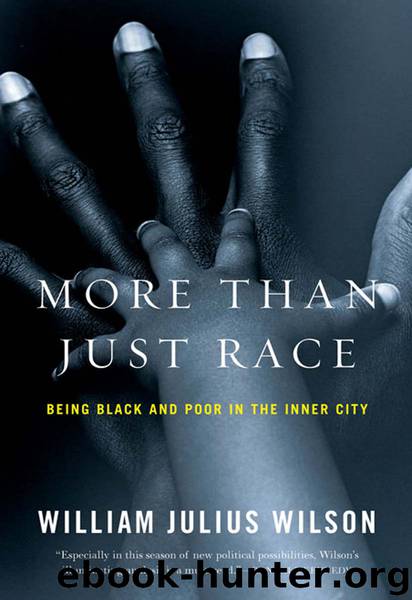More than Just Race by William Julius Wilson

Author:William Julius Wilson
Language: eng
Format: epub
Publisher: W. W. Norton & Company
Published: 2009-10-29T16:00:00+00:00
Conclusion
In the previous chapter I argued, on the basis of available evidence, that structural explanations of concentrated poverty in the inner city have far greater significance than cultural arguments, even though neither should be considered in isolation if we are seeking a comprehensive understanding of racial inequality because structural and cultural forces often interact in affecting the experiences and chances in life of particular racial group members. The evidence discussed in this chapter supports a similar conclusion: structural explanations of the economic woes of low-skilled black men are far more significant than cultural arguments, even though structural and cultural forces jointly restrict black male progress in some situations.
The disproportionate number of low-skilled black males in this country is one of the legacies of historical segregation and discrimination. However, aside from the effects of current segregation and discrimination, including those caused by employer bias, I highlighted a number of impersonal economic forces that have contributed to the incredibly high jobless rate of low-skilled black males and their correspondingly low incomes. These forces include the decreased relative demand for low-skilled labor caused by the computer revolution, the globalization of economic activity, the declining manufacturing sector, and the growth of service industries in which most of the new jobs for workers with limited skills and education are concentrated.
I noted that the shift to service industries has created a new set of problems for low-skilled black males because those industries feature jobs that require workers to serve and relate to consumers. Why are such requirements a problem for black men? Simply because employers believe that women and recent immigrants of both genders are better suited than black males, especially those with prison records, for such jobs. This image has been created partly by cultural shifts in national attitudes that reflected concerns about the growth of violence in the ghettos through the 1960s and ’70s. In the eyes of many Americans, black males symbolized this violence. Cries for “law and order” resulted in a more punitive criminal justice system and a dramatic increase in black male incarceration.
Cultural arguments have been advanced to explain the social and economic woes of low-skilled black males, but the evidence is mixed. For example, a number of studies have associated black joblessness with high reservation wages, the lowest wages that a worker is willing to accept. Nonetheless, one of the more compelling studies found no significant relationship between the reservation wages of black men and the duration of joblessness. The findings in an important recent study, however, clearly suggest that chronic poverty and exploitation in poor black neighborhoods tend to feed inclinations to distrust. These cultural traits undermine the development of cooperative relationships that are so vital in informal job networks. Black workers in the inner city tend to be less willing to recommend friends and relatives for jobs that become available. Thus, the structural problem of employer job discrimination and the cultural inclination to distrust combine to severely handicap low-skilled, black male workers, especially those with prison records.
Download
This site does not store any files on its server. We only index and link to content provided by other sites. Please contact the content providers to delete copyright contents if any and email us, we'll remove relevant links or contents immediately.
| African-American Studies | Asian American Studies |
| Disabled | Ethnic Studies |
| Hispanic American Studies | LGBT |
| Minority Studies | Native American Studies |
Cecilia; Or, Memoirs of an Heiress — Volume 1 by Fanny Burney(32558)
The Great Music City by Andrea Baker(32018)
Cecilia; Or, Memoirs of an Heiress — Volume 2 by Fanny Burney(31956)
Cecilia; Or, Memoirs of an Heiress — Volume 3 by Fanny Burney(31940)
We're Going to Need More Wine by Gabrielle Union(19045)
All the Missing Girls by Megan Miranda(16023)
Pimp by Iceberg Slim(14506)
For the Love of Europe by Rick Steves(14121)
Bombshells: Glamour Girls of a Lifetime by Sullivan Steve(14073)
Talking to Strangers by Malcolm Gladwell(13370)
Norse Mythology by Gaiman Neil(13363)
Fifty Shades Freed by E L James(13239)
Mindhunter: Inside the FBI's Elite Serial Crime Unit by John E. Douglas & Mark Olshaker(9339)
Crazy Rich Asians by Kevin Kwan(9290)
The Lost Art of Listening by Michael P. Nichols(7506)
Enlightenment Now: The Case for Reason, Science, Humanism, and Progress by Steven Pinker(7311)
The Four Agreements by Don Miguel Ruiz(6763)
Bad Blood by John Carreyrou(6621)
Weapons of Math Destruction by Cathy O'Neil(6279)
